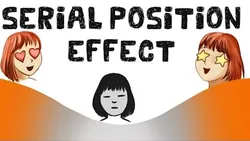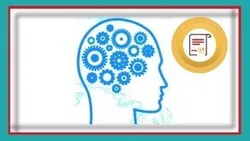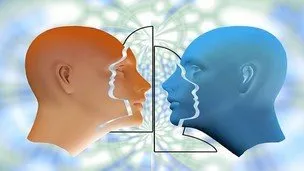
Cognitive Psychology 
Cognitive Psychology is the study of how the mind processes information. It covers topics such as the Serial Position Effect, Short Term Memory, Working Memory, Long Term Memory, False Memories and Memory Errors. These topics are explored through tests, examples and experiments, such as the Free Test, Primacy and Recency Examples, and the Mandela Effect. ▼
ADVERTISEMENT
Course Feature
![]() Cost:
Cost:
Free
![]() Provider:
Provider:
Youtube
![]() Certificate:
Certificate:
Paid Certification
![]() Language:
Language:
English
![]() Start Date:
Start Date:
On-Demand
Course Overview
❗The content presented here is sourced directly from Youtube platform. For comprehensive course details, including enrollment information, simply click on the 'Go to class' link on our website.
Updated in [February 21st, 2023]
1. Serial Position Effect: Learners can gain an understanding of the serial position effect, which is the tendency for items to be remembered better if they are presented first or last in a list. Learners can also gain insight into the primacy and recency effects, which are the two components of the serial position effect. Examples of the serial position effect are provided to help learners better understand the concept.
2. Short Term Memory: Learners can gain an understanding of short term memory, which is the ability to store and recall information for a short period of time. Learners can also gain insight into how to test and improve their short term memory through the provided free test and examples.
3. Working Memory: Learners can gain an understanding of working memory, which is the ability to store and manipulate information in the short term. Learners can also gain insight into how to test and improve their working memory through the provided test and examples.
4. Long Term Memory: Learners can gain an understanding of long term memory, which is the ability to store and recall information over a long period of time. Learners can also gain insight into how to test and improve their long term memory through the provided free test and examples.
5. False Memories and Memory Errors: Learners can gain an understanding of false memories and memory errors, such as the Mandela Effect. Examples are provided to help learners better understand the concept.
[Applications]
After completing this course in Cognitive Psychology, students can apply their knowledge to better understand how the mind works and how to improve their memory. They can use the Serial Position Effect to remember information more effectively, use mnemonics to remember things more easily, and use the House-Tree-Person Personality Test to better understand their own personality. Additionally, they can use the Emotion Wheel to better understand and manage their emotions, and use the Transtheoretical Model and Stages of Change to better understand how to make changes in their lives. Finally, they can use the False Memories and Memory Errors to better understand how memories can be distorted and use the Mind Palace to remember things more effectively.
[Career Paths]
1. Cognitive Psychologist: Cognitive psychologists study the mental processes of humans and animals, such as memory, problem solving, decision making, and language. They use a variety of methods, such as experiments, interviews, and surveys, to understand how the brain works and how it affects behavior. The field is rapidly growing, with new research and technology providing new insights into the workings of the mind.
2. Cognitive Neuroscientist: Cognitive neuroscientists study the biological basis of cognition, such as how the brain processes information and how it affects behavior. They use a variety of methods, such as brain imaging, to understand how the brain works and how it affects behavior. This field is rapidly growing, with new research and technology providing new insights into the workings of the mind.
3. Cognitive Behavioral Therapist: Cognitive behavioral therapists help people identify and change negative thought patterns and behaviors. They use a variety of techniques, such as cognitive restructuring, to help people understand how their thoughts and behaviors affect their emotions and behavior. This field is rapidly growing, with new research and technology providing new insights into the workings of the mind.
4. Cognitive Rehabilitation Therapist: Cognitive rehabilitation therapists help people with cognitive impairments, such as memory loss, improve their cognitive functioning. They use a variety of techniques, such as cognitive retraining, to help people improve their memory, problem solving, and decision making skills. This field is rapidly growing, with new research and technology providing new insights into the workings of the mind.
Course Provider

Provider Youtube's Stats at AZClass
Discussion and Reviews
0.0 (Based on 0 reviews)
Explore Similar Online Courses

YouTube SEO: How to Create Rank & Profit From YouTube Video

Numerical Analysis With Matlab

Python for Informatics: Exploring Information

Social Network Analysis

Introduction to Systematic Review and Meta-Analysis

The Analytics Edge

DCO042 - Python For Informatics

Causal Diagrams: Draw Your Assumptions Before Your Conclusions

Whole genome sequencing of bacterial genomes - tools and applications

Cognitive Psychology: Employee and Customer Behaviour

Cognitive Behavioral Therapy CBT Life Coaching Certification


Start your review of Cognitive Psychology